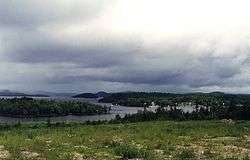Lake Utopia (New Brunswick)
| Lake Utopia | |
|---|---|
 Lake Utopia from the south, July 7, 2002 | |
| Location | Saint George Parish, Charlotte County, New Brunswick |
| Coordinates | 45°10′11″N 66°47′40″W / 45.16972°N 66.79444°WCoordinates: 45°10′11″N 66°47′40″W / 45.16972°N 66.79444°W |
| Basin countries | Canada |
| Max. length | 7 km |
| Max. width | 2.8 km |
Lake Utopia is located in eastern Charlotte County, New Brunswick.
The southern shore of the lake is one kilometer northeast of the town of St. George. The lake is connected to the Magaguadavic River by the second deepest natural canal in the world.
Lake Utopia is a popular recreation destination for eastern Charlotte County with swimming, boating and fishing being popular among year-round residents and cottage-goers. Fish in the lake include smallmouth bass, trout, perch and river eels.
Lake Utopia is approximately 7 kilometers long and between 0.8 and 2.8 kilometers in width. The lake level varies throughout the year, as more or less water is allowed through a hydroelectric dam on the Maguadavic River in St. George. The lake is surrounded by mixed Acadian forest and its shoreline is dotted by both rustic camps and large summer homes.
Canal Beach is the major swimming destination on the lake's western shore. It occupies a 0.5 kilometer stretch of shoreline and is beautiful natural sand.
Immediately north of Canal Beach is the natural canal which connects the lake to the Magaguadavic River. Canal Beach is equipped with a beach volleyball court, a playground, a canteen, washrooms and changing rooms.
On the eastern shore of the lake is a smaller, less popular swimming location called Scout's Beach (named after a Scouts Canada camp at that location). Scout's Beach is known locally as a "party spot" and the beach is host to two or three large gatherings every summer.
Lake monster
Local legend has it that the Lake is inhabited by a sea monster known as the Lake Utopia Lake Monster. The story goes that long ago two Maliseet Natives were canoeing on the lake when suddenly the monster appeared and chased them from one end to the other. Since the arrival of Europeans to the area in the late 18th century, the story has continued, with new sightings being reported every three-five years.
As noted in research by cryptozoologist Loren Coleman, the locals have called this cryptid "Old Ned." It has a decidedly long and bulky cetacean appearance, and may be representative of an unknown group of animals that travel back and forth between Lake Utopia and the Atlantic Ocean in routine cycles related to breeding and feeding.
Sightings: 1867 - Sawmill workers claim to see something 30 feet (9.1 m) long and 10 feet (3.0 m) wide thrashing in the lake. Similar reports the following days. 1868 - A Saint Croix Courier reporter says he and one other witness saw the monster. 1872 - Natives describe a terrifying monster with a large head and bloody jaws following their canoes. 1891 - William Francis Ganong records in his notebook a description of a monster provided by a lumberman who claimed to have seen it 20 years prior. "It was dark red in colour, the part showing above the water was 20 feet long and as big around as a small hogshead; it was much like a large eel." 1969 - The Saint John Evening Times Globe reports on an interview with Mrs. Fred McKillop, who said she saw a huge creature 18 years earlier. "It looked like a huge black rock... It moved up and down the lake, boiling and churning the water, making great waves." 1982 - Sherman Hatt says he and his family saw a large creature that looked like a submarine with spray coming from both sides and a hump out of the water about 10 feet (3.0 m) long. 1996 - Roger and Lois Wilcox were canoeing on the lake when they saw ripples break the placid surface 100 metres away from them. It was heading toward Cannonball Island, a common monster sighting spot. Wilcox reports the monster as being 40 to 50 feet (15 m) long, undulating upward, not sideways.
See also
References
- The Field Guide to Lake Monsters, Sea Serpents and Other Mystery Denizens of the Deep with Patrick Huyghe (NY: Tarcher-Penguin, 2003, ISBN 1-58542-252-5)